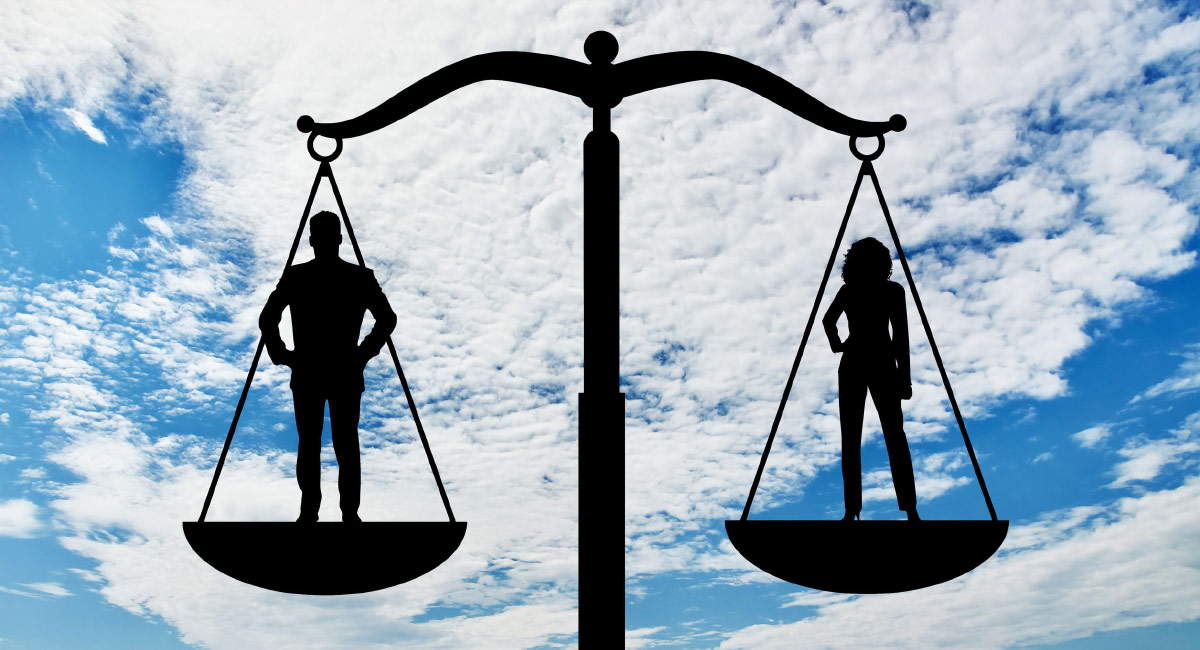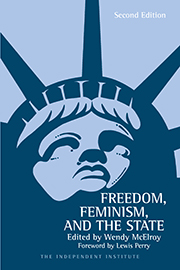Contemporary feminism’s preoccupation with its collectivist past has served to silence the voices of early individualist women. A perfect example is Dr. Gertrude B. Kelly (1862–1934), whose contributions to women’s rights are long forgotten. Like most early individualist feminists, Kelly insisted that individual autonomy and responsibility constituted the building blocks of social order and cooperation, both of which would evolve naturally under conditions of freedom. Whenever a group of people—a government or a labor union, for example—used force to impose its goals on individuals, social order and cooperation ceased. Then the only method by which true society could be reconstructed was to return power to the individual.
A labor radical who was deeply skeptical of unions, a medical doctor who opposed state licensing of medicine, a staunch anti-statist who broke with the most prominent individualist anarchists of her day, an ardent feminist who denied that there were “women’s rights” as distinct from “human rights” . . . who was Gertrude B. Kelly, and what specifically did she fight for?
In the opinion of Benjamin Tucker, editor of the pivotal individualist periodical Liberty, “Gertrude B. Kelly, . . . by her articles in Liberty, has placed herself at a single bound among the finest writers of this or any other country.” From her first article in Liberty (September 1885) to her bitter split with that same periodical over its debate on egoism versus natural rights (August 1887), Gertrude Kelly was one of Tucker’s most dynamic writers and, certainly, its most frequent female contributor. She was also a strong champion of natural law.
In particular, her articles brought a unique perspective on labor and women, for she was one of the few feminists of her time who believed “there is, properly speaking, no woman question, as apart from the question of human right and human liberty.” She looked forward to a society composed of individuals, in which such secondary characteristics as sex or race had no impact on the equal rights enjoyed by each person. As Kelly phrased it, “The woman’s cause is man’s—they rise or sink/Together—dwarfed or god-like-bond or free.”
The general cause shared by woman and man was the drive for “universal liberty, equality of rights, individual responsibility” as “the moving principles of societary progress.” The specific social injustice on which Kelly focused her considerable energy and insight was what she called “the plight of the working-class.”
Concern with Working Women
As a medical doctor who worked in the tenements and as the secretary of the Newark Liberal League, Kelly displayed a special concern for the debilitating effect of poverty on the laboring woman. Indeed, her first article in Liberty, titled “The Root of Prostitution,” argued that the inability of women to make an adequate living through respectable forms of labor was the cause of this profession. She wrote: “We find all sorts of schemes for making men moral and women religious, but no scheme which proposes to give woman the fruits of her labor.”
The condemnation aired in this article expressed two themes that were common to most of Kelly’s analyses of poverty and of women.
First, women had been oppressed by cultural stereotypes created primarily by men. She declared, “Men . . . have always denied to women the opportunity to think; and, if some women have had courage enough to dare public opinion, and insist upon thinking for themselves, they have been so beaten by that most powerful weapon in society’s arsenal, ridicule, that it has effectively prevented the great majority from making any attempt to come out of slavery.” She leveled this charge equally at the supposedly enlightened men in her own political circle, whom she claimed would “immediately change not only the serious topics of conversation, but change the very tones of their voice” when wives or sisters entered the room.
Second, charitable organizations created by the rich were hypocritical in their attitudes and behavior toward the poor, who needed to become self-sufficient and not to be further victimized by misguided benevolence. She particularly ridiculed the philanthropic groups so popular in her day in which working “girls are given lessons in embroidery, art, science, etc., and are incidentally told of the evils of trade-unions, the immorality of strikes, and of the necessity of being ‘satisfied with the condition to which it has pleased God to call them.’”
Like most radical individualists of nineteenth-century America, Kelly viewed “capitalism” as the major cause of poverty and social injustice. This conviction sprang from two other beliefs. First, she accepted a particular version of the erroneous labor theory of value that was espoused by the pathbreaking individualist Josiah Warren: this version is commonly expressed as “cost is the limit of price.” Second, she shared the popular radical belief that capitalism was an alliance between business and government, in which the latter guaranteed legal privileges to the rich. In essence, Kelly considered all forms of capitalism to be what contemporary individualists call “state capitalism.”
Free Market as Cure
Accordingly, she mistakenly believed that interest, profit, and rent were usuries through which capitalists exploited laborers by usurping the product of their labor. Although it sounds ironic to modern ears, Kelly—along with many other early individualist theorists—considered the free market to be a cure for capitalism. She considered voluntary cooperation, unregulated by anything but the laws of economics and the desires of individuals, to be the solution to this social injustice.
For example, in her article “The Unconscious Evolution of Mutual Banking,” Kelly suggested a remedy for the state monopoly of money, which caused the usury of “interest”: the establishment of privately controlled currency (or currencies). She exuded, “the free monetary system with its destruction of interest and profit, looms up before us! The exchange of product against product is inaugurated! The social revolution accomplishes itself!”
In other words, to sever the alliance between government and business that constituted capitalism, it was necessary to deny government any power over the economic arrangements of individuals, for “all the laws have no other object than to perpetrate injustice, to support at any price the monopolists in their plunder.” In her opinion, a free market in which individual contracts—and not government—set prices would eliminate practices such as charging interest.
But what if she were proven wrong? What if interest and other forms of usury continued to exist within the framework of a free market? Contributors to Liberty were clear and consistent on at least one point. Individuals had the absolute right to enter into agreements [p. 625] which Liberty contributors considered to be foolish and self-destructive. Any interference into such voluntary contracts constituted the use of force, which was the more primary evil. As Kelly commented, “[W]e realize the labor question can never be solved by force. . . . You cannot shoot down or blow up an economic system, but you can destroy it by ceasing to support it, as soon as you understand where its evils lie.” But if a free individual could not be persuaded away from paying interest, then that individual would have to live with the folly of his or her own actions.
It is important to understand Kelly’s history in order to fully appreciate her opposition to usuries such as rent and interest. As an immigrant from Ireland in 1873, Gertrude Kelly’s introduction to individualistic philosophy was probably through the columns of “Honorius” in Irish World—an organ of the Irish No Rent movement. Honorius was, in fact, a pseudonym for the American natural-rights advocate Henry Appleton, who contributed frequently to the early issues of Liberty, both under his own name and under the pen name of “X.”
Kelly could not have been indifferent to the absentee British landlords whose claims to most of Ireland’s fertile soil came from conquest and legal privilege. The exorbitant rent and interest they charged the Irish for use of land and money were a major cause of that country’s poverty. On coming to America, Kelly did not seem to think that the differing histories of the two nations required differing economic and political analysis. She applied the same principles to both—principles she had derived partly from reading English classical liberals such as Herbert Spencer and John Stuart Mill, both of whom her articles often quoted.
In articles that displayed a deep breadth of reading that ranged from Proudhon and Godwin to Malthus, Kelly also displayed a level of common sense uncommon among political visionaries. She advised fellow individualists who wanted to pursue dubious reforms to ease the immediate problems of female labor and to educate themselves, instead, by listening to the voices of working women. Reformers with grand schemes should take “lessons from Miss Corson on how to make a neck of beef last a family of six persons for three weeks.” Only by understanding the daily realities faced by working women with hungry children could radicals address the needs of this class of labor.
In short, Kelly infused the nineteenth-century individualist dialogue with a refreshing though harsh dose of women’s reality, both in her discussion of issues and of events.
The Haymarket Incident
Kelly’s insistence on principle linked to common sense helped to anchor radical individualism to the goal of nonviolence, especially when the movement was pressured to respond to violent events of its day. Her influence may be judged by her response to one particular event, which history calls “the Haymarket Incident.” In the wake of this event most radicals—including other prominent feminists and some individualists—cried out for blind vengeance against the State. Kelly offered a voice of reason.
On May 4, 1886, a large crowd of laborers assembled in the Haymarket Square of Chicago to protest against recent police brutality. As the meeting began to break up peacefully due to rain, the police hurried the process along. From the sidelines, someone threw a bomb toward the police, who opened fire at the laborers. The shots were returned. In the final count, seven policemen and a number of protesters—estimated to be as high as 20—died.
The police rounded up labor leaders, with no regard to whether they had been involved in the violence or not. Eventually, seven men were tried for murder in a court case that has been generally accepted as a wholesale travesty of justice. For example, the jury was not chosen in the normal manner: a bailiff was instructed to go out into the street and select whomever he wished from the passers-by.
Most feminists responded with shock, outrage, and bitter pain. For example, on reading a newspaper headline stating that the Haymarket protesters (communist anarchists and labor radicals) had thrown a bomb into an assembled crowd, the teenaged individualist-feminist Voltairine de Cleyre had exclaimed aloud, “They ought to be hanged!” She keenly and instantly regretted the words, and assumed the opposite position with equal vehemence. Fourteen years later, de Cleyre remained sorely haunted by her words, “For that ignorant, outrageous, blood-thirsty sentence I shall never forgive myself.” Much of de Cleyre’s political activity in the ensuing years can be seen as an attempt to expiate her sin. Her most passionate addresses were delivered as lectures at the yearly memorials to the Haymarket martyrs that she attended.
In Living My Life, the socialist feminist Emma Goldman described her reaction to the judgment in the Haymarket trial as a result of which five of the men were condemned to death. After becoming hysterical Goldman was put to bed, where she fell into a deep sleep. On awakening, she discovered something new and wonderful within her soul. It was “a great ideal, a burning faith, a determination to dedicate myself to the memory of my martyred comrades, to make their cause my own.” She left her newly wed husband and proceeded to New York to prepare for the task that would consume the rest of her life.
Against this backdrop of passionate and profound reaction among feminists, Kelly called for a calm and measured response. She refused to consider retaliation in kind against the state because force could never be an appropriate means by which to achieve social ends. In an appeal for restraint, she wrote, “Oh my brothers! let no blind feelings of revenge against the state and its tools lead you to play into its hands by attempting to meet force with force. . . . Remember that the employment of force leads to the redevelopment of the military spirit, which is totally opposed to the spirit that must exist in the people before anything that we wish for can be brought about.”
Over and over again, Kelly stressed education. Individualists had to rely on enlightenment and persuasion because ignorance was their main opponent. Although the content was an essential factor in the process of educating people, the method was equally important. It not only had to be nonviolent, but also privately funded since taxation and the public funding that sprang from taxes were the sort of violence against property known as theft.
The Private Funding of Education
On June 1, 1887, Kelly delivered a remarkable speech titled “State Aid to Science” before the Alumnae Association of the Women’s Medical College of the New York Infirmary for Women and Children, at which she had studied. It was remarkable because—at a time when feminists called out for various forms of state assistance to educate women—Kelly addressed the destructive consequences of governmental attempts to promote knowledge. It was also remarkable because Gertrude Kelly was a medical doctor and, as such, she was expected to tolerate, if not to revere outright the institutions that conferred social status on her profession.
Published as an article in Liberty, this speech presented two themes: “first, that progress in science is lessened, and ultimately destroyed, by state interference; and, secondly, that even if, through state aid, progress in science could be promoted, the promotion would be at too great an expense of the best interests of the race.”
Kelly argued for the impossibility of government’s promoting knowledge by pointing out that a subsidy “is not and cannot be aid to Science, but to particular doctrines or dogmas, and that, where this aid is given, it requires almost a revolution to introduce a new idea.” Such an arrangement of government patronage creates “a great many big idle queens at the expense of the workers.”
But, even granting for the sake of argument that state aid could promote knowledge, Kelly contended that the cost of this promotion would enormously outweigh any advantage. The cost would be the violation of property rights through the taxation that would be necessary to support the government’s program. If ordinary people sufficiently valued the service being funded by the state, then tax funding wouldn’t be necessary. If they didn’t value it, then the government had no right to take money from the worker to finance officially desirable knowledge. “I maintain,” Kelly insisted, “that you have no right to decide what is happiness or knowledge for him, any more than you have to decide what religion he must give adherence to. You have no right to take away a single cent of his property without his consent. Woe to the nation that would strive to increase knowledge or happiness at the expense of justice. It will end by not having morality, or happiness, or knowledge.”
Using similar logic, Kelly opposed any government attempt to license physicians or regulate medicine because government could not guarantee the safety or quality of medical care. It could only create a quasi-union of medical elites and block progress.
On the state funding of education, as in all issues, Kelly demanded “no compromise” with the principles of individual autonomy and individual responsibility—in short, with the doctrine of individual rights. Indeed, it was her devotion to natural law that led her to depart from Liberty when it became a forum for Stirnerite egoism. (For more on the argument between natural law and the egoism of Max Stirner, see my article, “The Non-Absurdity of Natural Law.”) Kelly contributed, instead, to the brief journal entitled Nemesis, then began to write for the periodical Alarm under the editorship of Dyer D. Lum. Her departure from Liberty robbed that periodical of an able defender of natural-rights theory and of its most forceful voice for women.
In like manner, Gertrude B. Kelly’s absence from the pages of feminist history impoverishes that movement. Disillusioned with the “philosophical individualism” of Liberty, Kelly went on to express her principles through action and became the director of a clinic for the poor in the Chelsea district of New York City. As an outlet for writing and theory, she turned to the cause of women’s suffrage and of Irish independence, becoming a prominent member of the Irish Women’s Council. Ironically, two years after her death in 1934, Mayor Fiorello La Guardia dedicated the “Dr. Gertrude B. Kelly Playground” on 21st Street.










